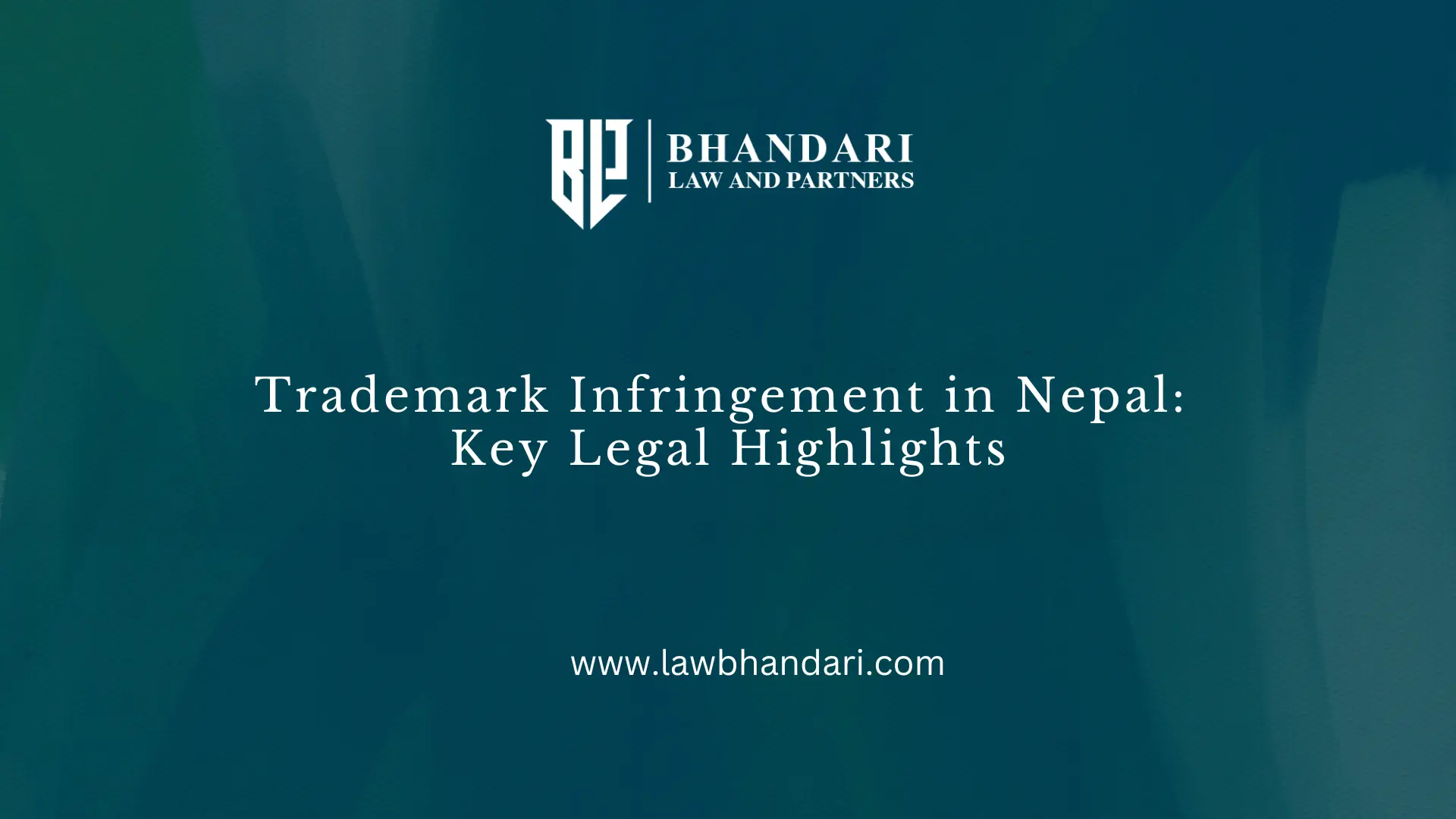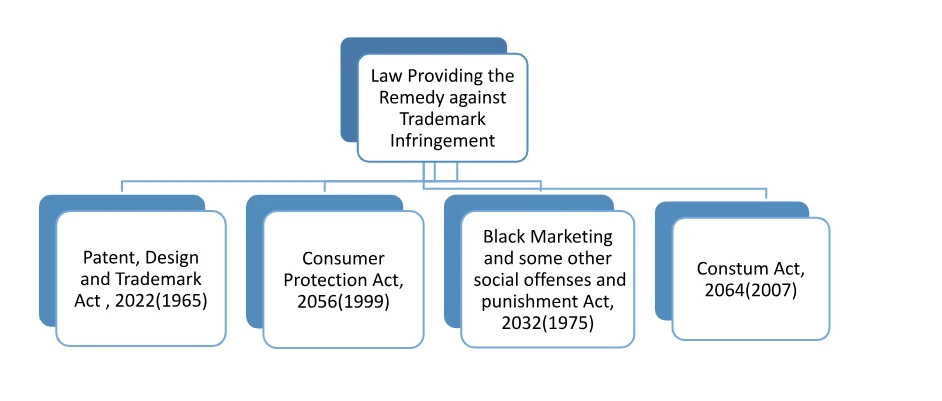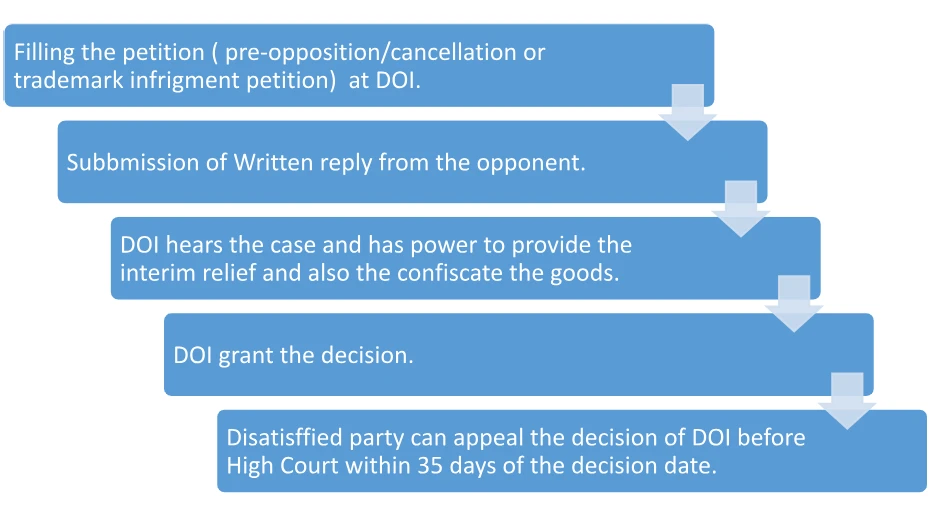Table of content
-

Trademark Infringement in Nepal: Key Legal Highlights
01. Introduction
This article comprises details regarding the legal remedy available in regard to trademark infringement in Nepal under Nepalese Law.
02. Governing Law Related to Trademark Infringement in Nepal
The primary legislation governing trademark protection and infringement in Nepal is the Patent, Design and Trademark Act, 2022 (1965) ("PDTA"). This Act serves as the foundational legal instrument for the registration, protection, and enforcement of trademarks.
In addition to PDTA, other relevant laws contribute to the legal framework for addressing trademark infringement:
- Civil Code, 2074(2017): Under the Civil Code, 2074, injunction is provided as a remedy against trademark infringement
- Customs Act, 2064 (2007): This empowers customs officers to intercept and seize infringing goods at Nepal's borders.
- Black Marketing and Some Other Social Offenses and Punishment Act, 2032 (1975): This law penalizes the sale of counterfeit or infringing goods in the domestic market.
- Consumer Protection Act, 2075 (2018): This Act safeguards consumer rights against deceptive trade practices, which encompasses the sale of fake branded goods.
Nepal is also a signatory to international treaties such as the Paris Convention for the Protection of Industrial Property, 1883(“Paris Convention”), the Agreement on Trade-Related Aspects of Intellectual Property Rights ("TRIPS"), and the Convention Establishing the World Intellectual Property Organization (“WIPO Convention”), which further shape its approach to intellectual property rights.
02. Governing Authority
The main governing authority for trademark matters in Nepal is the Department of Industry ("DOI"), operating under the Ministry of Industry, Commerce, and Supplies. The DOI holds dual functions:
-
Administrative Functions: This includes the processing of trademark applications, registration, renewal, modification, and assignment of rights. It maintains the official trademark registry.
-
Quasi-Judicial Functions: The DOI is empowered to adjudicate disputes concerning trademark infringement. It can issue cease and desist orders, conduct investigations, and even order the cancellation of registrations obtained in bad faith or those deceptively similar to existing marks.
03. Remedies Trademark Infringement Case Under Various Act
Nepalese law offers a comprehensive range of remedies to trademark owners seeking to address infringement. These remedies can be broadly categorized into civil, criminal, and administrative actions:

3.1. Remedies under the PDTA 2022 (1965)
|
Condition of Infringement of Trademark under PDTA
|
|
Compensation PDTA in section 25 has the provision of compensation in case of infringement of Trademark. |
|
Fine
|
|
Confiscation:
|
|
Implementation of the Applicable Remedy
|
3.2. Remedies under the National Civil Code, 2074 (2017)
Condition of Civil Code, 2074(2017)
-
Under Section 26(3) of the Civil Code, 2074, injunction is provided as a remedy against trademark infringement. Therefore, if a trademark owner has reasonable grounds to believe their trademark rights are being infringed, they can file a petition to the court for an injunction to prevent or mandate certain actions.
Note: An injunction is a court-ordered remedy compelling a defendant to perform or cease a specific act.
3.3. Remedies under Customs Act, 2064 (2007)
|
Condition of Custom Act
|
|
Confiscation As per Section 68 of Custom Act, if an application is made for trademark infringement to the concerned Customs Officer, it shall withhold such goods in the Customs Office. |
|
Implementation of the Applicable Remedy
|
3.4. Remedies under the Black Marketing and Some Other Social Offenses and Punishment Act, 2032 (1975)
|
Condition of Infringement of Trademark under Black Marketing Act
|
|
Punishment
|
|
Confiscation
|
|
Implementation of the Applicable Remedy
|
3.5. Remedies under the Consumer Protection Act, 2075 (2018)
|
Condition of Infringement of Trademark under Consumer Protection Act
|
|
Punishment
|
|
Confiscation
|
|
Implementation of the Applicable Remedy
|
04. Trademark Enforcement
There are various acts available for remedy against the infringement of Trademark in Nepal. PDTA, Black Marketing Act, Consumer Protection Act, Import Export Control Act and Custom Act are some of the laws that provide remedy for the infringement of Trademark in Nepal. However, it depends upon the parties to choose the best remedy amongst the available and applicability also depends on nature of infringement and the factual circumstance.
4.1. Opposition of Trademark in Nepal
The opposition should be filed before the DOI within 90 days from the date of publication of challenged mark in the IP Bulletin along with the evidences substantiating the contention of opposition. The DOI then notifies the opponent, who has 7 to 15 days to reply on the contention of opposition. Hearings are scheduled, with each party allowed two postponements. DOI has the power to provide the interim relief and also confiscate the goods. The DOI's decision can be appealed to the High Court.
4.2. Cancellation of Trademark in Nepal
A petition for cancellation of a registered trademark can be filed with the DOI if the trademark was ineligible for registration under Section 18(3) of the PDTA, or if it infringes upon the reputation of another trademark or is similar to an already registered one.
Once the petition is filed, the DOI notifies the trademark owner, who has seven days (extendable to 15) to submit a written reply. After this, or upon expiry of the reply period, the DOI schedules a hearing. Each party can postpone the hearing up to two times. While there's no fixed timeline, the DOI generally takes 8 to 14 months to resolve a cancellation petition.
4.3. Infringement Action
Action can be taken for trademark infringement when a mark is identical or confusingly similar to a registered trademark that is used without authorization, as prohibited by Section 16(2) of the PDTA. The unauthorized use of a cancelled or previously registered trademark is punishable under Sections 19 and 25 of the PDTA.
The owner of a registered trademark can seek an order to prevent the unauthorized use of the infringing mark, the confiscation of infringing goods, and damages for losses incurred due to the infringement. Section 19 empowers the DOI to impose a fine of up to NPR 100,000/-(One Lakh Rupees) on infringers and to confiscate infringing goods. While Section 25 allows for claims of actual damages, there's currently no established practice or mechanism for calculating this damage. Nonetheless, damages can be estimated by considering government and legal fees, along with actual losses based on the infringer's sales or profits.
The PDTA does not specify a timeline for initiating infringement actions, but it is advisable to do so promptly upon discovery of the infringement to mitigate further damage to the registered trademark. The DOI schedules hearings for trademark disputes based on its workload, typically taking 8 to 14 months to resolve such petitions.
Alongside an infringement petition, an interlocutory order can be requested from the DOI to halt the production and distribution of infringing products. The DOI often directs infringers to cease unauthorized use and has, in some cases, confiscated infringing goods. There have also been instances where fines were imposed or damages awarded against trademark infringers.
05. Action Against Counterfeit Goods in Nepal
The main legislation governing Black Marketing and Counterfeiting in Nepal is Black Marketing and some other Social Offences and Punishment Act, 2032 (1975). The cases under Black Marketing Act are state cases and are initiated through First Information Report (FIR) before the concerned Police Office. The Chief District Officer ("CDO") is the Concerned Authority to adjudge the case under Black Marketing Act.
Additionally, one can file for injunctive relief to stop counterfeit product before the DOI, District or High Court.
06. Passing Off
While Nepal's legal framework doesn't explicitly define "passing off," the concept is implicitly recognized through the interpretation of Section 18(1) of the Patent, Design, and Trademark Act (PDTA). This section stipulates that a proposed trademark likely to harm the reputation of an existing trademark may not be registered. This provision effectively extends protection to unregistered trademarks, allowing for a "passing off" action to safeguard their reputation even without formal registration in Nepal. Therefore, a trademark that isn't registered in Nepal can still find protection under the principles akin to a passing off claim.
Concept of Passing off though indirectly recognized in the PDTA, Nepalese Court has not recognized the concept of passing off through the Court decisions yet.
07. Preventive Action for Trademark Protection in Nepal
7.1. Trademark Registration
In Nepal, the trademark is protected based on the registration. Section 16 of PDTA provides that anyone can accrue rights over a trademark used or to be used in respect of their business or commercial transactions, by registering the trademark in the DOI.
Additionally, Section 21B of the PDTA strictly requires that foreign trademarks need to be registered in Nepal to obtain protection.
PDTA does not explicitly guarantee protection of a trademark based on use and reputation. However, in some instances, the DOI has protected few trademarks despite lack of registration on the ground of well-known-ness of such trademarks.
7.2. Surveillance and Monitoring
Trademark owners should actively monitor new trademark applications and the marketplace (both online and physical) to detect unauthorized or confusingly similar use. Often, watch services i.e. notification of new filings and market surveillance tools are used for the purpose of surveillance and monitoring of trademark.
08. Recognition of Foreign Well Known Trademarks in Nepal
PDTA in Nepal doesn't have a specific provision for protecting foreign well-known trademarks based solely on their use. However, Section 18(1) and 18 (3) of PDTA allow the DOI to reject trademark registration or cancel existing trademarks if they are likely to harm the reputation of an individual, institution, or another trademark. This broad provision can be used to protect well-known trademarks and address passing off cases.
Despite of the provision of Section 18(1) and 18(3), the DOI has often interpreted these sections narrowly. Many of the court judgments have supported the DOI's decisions, there hasn't been a clear ruling from the Supreme Court on protection of well know trademark.
Additionally, Nepal has not reflected the direct provision of well-known trademark as per the Article 6B of the Paris Convention on the Protection of Well-Known Trademarks into the PDTA. Although the Treaty Act of 1990 states that international treaties will take precedence over domestic laws if they are consistent, foreign well-known trademarks have rarely received protection in Nepal, and there hasn't been a clear and specific Supreme Court judgment on the issue.
09. Landmark Cases of Trademark in Nepal
9.1. Kansai Case (Kansai Nerolac Paints Ltd. vs. Rukmini Chemical Industries Pvt. Ltd. NKP 2077 Decision no. 10561)
The ratio decided in this case establishes that the assessment of similarity in trademarks whether in terms of words, symbols, logos, or phonetics is a valid ground for refusing or cancelling a registration. It also affirms that when a trademark has been registered with prima facie bad faith or malicious intent, such conduct invalidates any claim regarding the statute of limitations for cancellation. Furthermore, if a foreign company’s or another entity’s trademark is registered in bad faith, and neither the applicant nor the Office of Company Registrar (OCR) can demonstrate bona fide intent during the registration process, then no limitation period applies to challenge or cancel such a registration.
9.2. Madam Parsad Lamsal Case (Madan Lamsal vs. Repsona Publication PVT LTD, Decision no. 8686 N.K.P. 2068)
This case revolves around a trademark dispute between a petitioner, who publishes a magazine titled "New Business Age" under the registered trademark "Trademark Business Age," and a respondent, who publishes a magazine named "Business Age." The petitioner initially lodged a complaint with the Department of Industry (DOI) to prevent the respondent from using the "Business Age" trademark.
The respondent, in defense, asserted that both parties were joint owners of the respondent company, which published "Business Age." They further alleged that the petitioner fraudulently registered the "Business Age" trademark in their own name, arguing it should have been registered under the respondent company's name. The respondent also highlighted their long-standing use of the "Business Age" mark, contending that they should not be prohibited from using it. Additionally, the respondent filed a separate complaint with the DOI seeking to restrain the petitioner from using the "Business Age" trademark.
The DOI's initial ruling instructed both parties to use their respective trademarks in a manner that would prevent confusion. Dissatisfied, the petitioner appealed this decision to the then Court of Appeal, Patan. The Court of Appeal partially overturned the DOI's decision, citing the DOI's failure to follow mandatory procedures. However, it rejected the petitioner's request for the confiscation of the respondent's goods bearing the "Business Age" trademark.
Subsequently, the petitioner appealed to the Supreme Court. The Supreme Court overturned the DOI's decision regarding trademark ownership, declaring the petitioner as the rightful owner of the "Business Age" trademark.
The fundamental principle established by this case is that only trademarks formally registered under Nepalese law receive legal protection, irrespective of the duration of their prior use.
9.3. Noor Pratap Raja Case Vs Basnet Footware (NOOR Pratap Rana, Partner of M/s Krian Shoes Manufactures v. Basnet Footware et al, Decision no. 7536, N.K.P. 2062)
Decision No. 7536 of the Nepal Supreme Court, in the case of Noor Pratap Rana vs. Basnet Footwear, clarifies key principles of Nepalese trademark law, defining a trademark as a distinguishing mark for goods or services. The ruling strongly emphasizes that while the law permits trademark registration, possession of a valid registration certificate is crucial for legal protection, asserting that mere prior use or goodwill without formal registration may not grant exclusive rights. Furthermore, the decision implicitly recognizes the relevance of international trademark registrations, particularly in the context of conventions like the Paris Convention, when seeking registration in Nepal.
9.4. Amrit Distrlllerty Vs Facebook Inc (Amrit Distilleries Pvt. Ltd v. Facebook Inc, Case No.074-DP-1229,, N.K.P.2075)
In this case, the Appellant, Amrit Distillery, sought to register the mark "FACEBOOK" under Class 33 in Nepal, which was opposed by the Respondent on the grounds that it was deceptively similar to their already registered "FACEBOOK logo" trademark in multiple other classes. The Department of Industry (DOI) ruled against the Appellant, a decision later upheld by the High Court. The Court emphasized that trademarks should not dilute the reputation of existing marks through unfair practices, and simply falling under a different class is insufficient if the mark resembles an established one. It further held that the Appellant failed to demonstrate prior use, goodwill, or registration of the mark, and appeared to be capitalizing on the Respondent’s reputation. Recognizing "FACEBOOK" as a well-known mark, the Court concluded that such marks are entitled to cross-class protection even without specific registration in all classes.
9.5. Prefect Blend Pvt Ltd Vs Visa International (Perfect Blends (Nepal) Pvt. Ltd. v. VISA International, Case No. 075-DP- 0048, N.K.P. 2076)
In this case, the Appellant sought to register the trademark "VISA (and logo)" in Class 34, which was opposed by the Respondent on the grounds that it was deceptively similar to the globally recognized "VISA" trademark. Although the Appellant claimed prior use of the mark since 1976, the Department of Industry rejected the registration, and the High Court upheld this decision on appeal. The Court emphasized the protection of well-known trademarks and upheld the principle of cross-class protection. In doing so, it referred to the Facebook Inc. v. Amrit Distillery judgment and the Joint Recommendation on the Protection of Well-Known Marks. The Court also cited Article 16(2) and (3) of the TRIPS Agreement, which extends protection to well-known trademarks across dissimilar goods or services if their use could cause confusion or harm the interests of the original trademark owner.
Related Article Link:
Trademark Registration in Nepal
Patent, Design and Trademark Act of Nepal, 1965: Highlights
Date of Publication: 17 July 2025.
Disclaimer: This article published at our website is just for information purpose only. It shall not be taken as the legal advice, advertisement, personal communication, solicitation or inducement. Bhandari Law and Partners or any of the team members of the firm shall not be liable for the consequence arising of the information provided. As the factual situation may be different on your case, thereof if you need further legal advice on the subject matter, please Contact Us
Related Professionals:
Frequently Asked Question
For quick legal assistance:
You can directly call to our legal expert: +977-9808811027
Even can call or drop a text through What’s app , Viber, Telegram and We Chat at the same number.
Also can do email on : info@lawbhandari.com

contact us
Phone :,
,Connect with our professional lawyers in Nepal :
Follow Our Law Firm on Social Media :